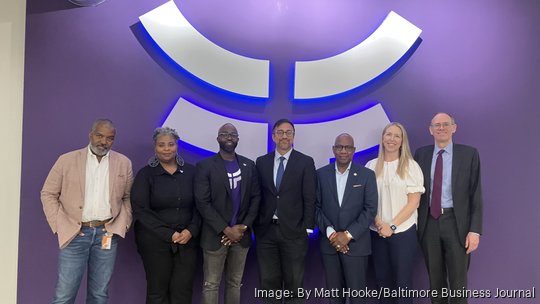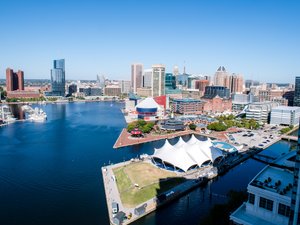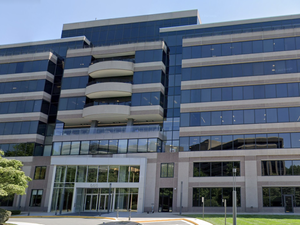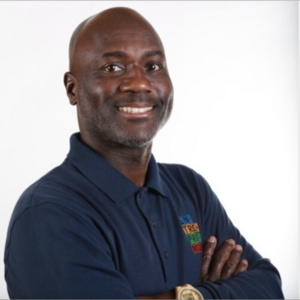
The federal government designated the Baltimore region as a federal tech hub on Monday, a move that could funnel millions of dollars into the region and create tens of thousands of jobs.
Baltimore is one of 31 federal Tech Hubs, a Biden administration initiative overseen by the U.S. Commerce Department's Economic Development Administration. The region will compete with the other tech hubs for a slice of $10 billion in federal funding over five years. The Baltimore region plans to use federal money to blend artificial intelligence with biotechnology to create innovative health care products.
The Greater Baltimore Committee led a coalition of 38 technology-focused organizations including Morgan State University, UpSurge, Fearless, Mindgrub Technologies, Johns Hopkins University and more to submit an application to the federal government in August. Director of Impact at Fearless LaToya Staten and Conscious Venture Lab Founder Jeff Cherry will oversee the work over the next four to six months as chairs of the GBC Game Changers committee.
As a sign of Baltimore's prominence in the program, GBC CEO Mark Anthony Thomas introduced Joe Biden at a press conference Monday afternoon announcing the 31 tech hubs.
"Like many post-industrial communities in America, Baltimore's faced long standing challenges, suffered economic setbacks and until recently lacked the federal support to tell a brighter, more vibrant story," Thomas said during the news conference.
In addition to Baltimore City, the tech hub designation includes Baltimore, Harford, Howard, Carroll, Cecil, Queen Anne’s and Anne Arundel counties. The coalition believes the federal funding could create 52,000 jobs in the region's health care sector by 2030.
The announcement opens a new funding opportunity for selected hubs that can now apply for between $40 million and $70 million each. The coalition expects the funding to be announced in early 2024, Staten said. It's part of a $500 million spree to kick start the national project under the CHIPS and Science act of 2022.
"Over the past few decades, these communities lost more than jobs," President Joe Biden said. "They lost a sense of their sense of dignity and opportunity, a sense of pride, we are going to change all that."
The Baltimore hub will focus on integrating AI into health care to create “predictive health care.” Predictive health care will create new pharmaceuticals, help doctors make decisions, and create more personalized forms of medicine. The GBC will operate as the administrator of the fund and different consortium members will submit ideas for projects that fit the tech hub vision, Staten said.
The consortium has five types of projects that it plans to fund with the federal money: accelerators, physical innovation hubs, bio-manufacturing facilities, lab infrastructure and workforce development. The categories are broad enough to include a variety of projects, from collaborations with Morgan State University on new take-home sensors for outpatient care to projects focusing on improving the national supply chain, GBC Chief Economic Officer Pothik Chatterjee said. The consortium has identified 40 possible projects that would cost around $700 million to implement over the next five years.
"We have a lot of diversity in the backgrounds of our consortium members," Chatterjee said. "Not just racially, not just gender wise, but also in terms of expertise. We have rural, we have manufacturing, bio-manufacturing, we have urban players, we have R&D experts. We have a full spectrum of health care and technology expertise, that's why I think we won."
As part of the designation, the region will benefit from federal expertise. The U.S. Department of Agriculture will find rural development programs that could benefit from tech hub funding while the U.S. Department of Housing will work with cities to develop long-term housing for workers.
Maryland has already begun to pursue research activity in the areas benefiting from the technology hub. The University of Maryland Baltimore recently launched a partnership with the University of Maryland, College Park to research the blending of AI and health care.
The Baltimore consortium will try to create a model for equitable development of technology, or “equi-tech,” according to the application. Equitable development of AI would focus on ensuring that the advanced programs are free from bias. One of the partners on the technology hub application, Morgan State University, has a research center devoted to AI ethics.
Other notable tech hubs selected by the federal government include the Ocean Tech Hub in Providence, Rhode Island, and the Greater Philadelphia Region Precision Medicine Tech Hub. The federal government hopes to diversify research outside of the traditional technology centers of Boston, Silicon Valley and New York.








